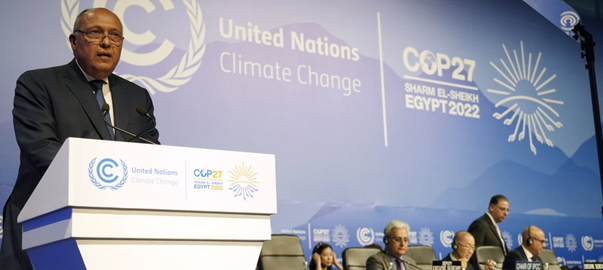Covering COP27 for the English P-Seminar "Our global connections"

One of the most important climate conferences worldwide took place in Egypt in November 2022. The 27th “Conference of the Parties“ started on November 6th and went on for two weeks. More than 190 countries were represented. The goals of the conference were climate protection measures that had already been agreed on in the Paris Climate Agreement of 2015, limiting global warming to 1.5°C. Even before the conference started, climate activists and scientists knew that this meeting would be the last one with a chance to agree on necessary measures to meet the 1.5°C limit. They also assumed that the results of the consultations wouldn’t be enough to really take action against the climate crisis because those debates would be just talk without binding agreements.
In particular, financial issues were discussed at the meeting. According to climate activists, industrial countries like Germany are most responsible for the climate crisis because their industries emit significant amounts of carbon dioxide. That’s why those developed countries should support countries of the Global South.
In the preliminary negotiations, the countries of the Global South succeeded in putting the issue of loss & damage on the agenda.
According to “Fridays for Future”, the rich nations have an obligation to pay for climate damage, loss and adaptation. This is a matter of justice because the people living in those areas are suffering the most from the effects of the climate emergency, although they are the least responsible for it.
Those regions are also called “MAPA” to replace the term “Global South.“ MAPA stands for Most Affected People and Areas. Those “most affected people” are fighting for climate justice and want to show that they are not voiceless, only unheard.
Furthermore, they are not prepared for a crisis of such dimensions with catastrophic floods, droughts, forest fires and hurricanes. The damage those extreme weather conditions cause, must be compensated by the countries of the Global North with financial means since those affected countries certainly don’t have the money for that.
Climate activists and scientists demand an end to fossil fuels such as coal, oil and gas. They also call on the German government to finally comply with the Paris Agreement and live up to its international responsibility.
Activists from all over the world came to the conference in Egypt to draw attention to the injustice of the climate crisis. In addition to a strong reduction of greenhouse gases, they demanded financial resources for poorer countries. More than 50 countries of the Global South face bankruptcy in the near future because of inflation, the global economic crisis, the energy crisis (prompted by the war Russian invasion of Ukraine) and the climate crisis.
On the 11th day, the first draft of the final declaration was presented. The main issue was about loss and damage payments. But the highlight on the same day was the so-called “People’s Plenary”. At this event, hundreds of climate activists stormed the COP, demonstrating solidarity between the Global North and the Global South.
All in all, COP27 can be seen as a summit with poor results and without many breakthroughs. And this despite the fact that we have no more time to lose and the 1.5°C limit is moving more and more beyond our reach. However, the fact that financial
aid for climate damage to poorer countries has been accepted and discussed is a great success. We must remember: Climate change is reality, especially in countries of the Global South.
Host country Egypt wants to deliver action instead of empty words despite the difficult time of a global economic crisis. Germany ought to use its global connections and all its political weight to give the solution of the climate crisis its utmost priority.
Franziska Burzler, Englisch-P-Seminar „Our global connections“ (2021/23)
© Reuchlin-Gymnasium Ingolstadt
Reuchlin Gymnasium
Gymnasiumstraße 15
85049 Ingolstadt
